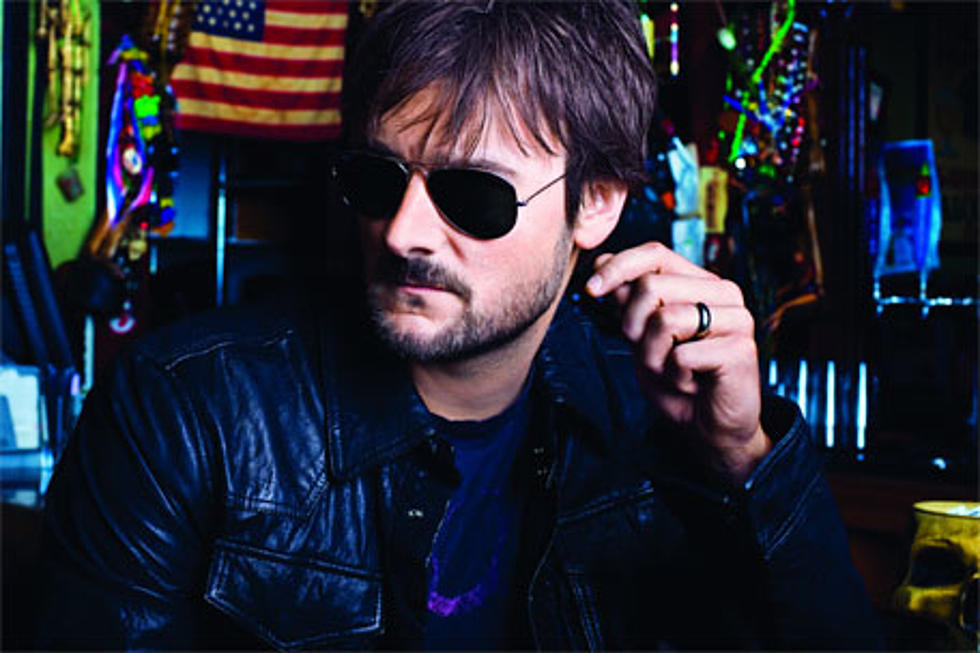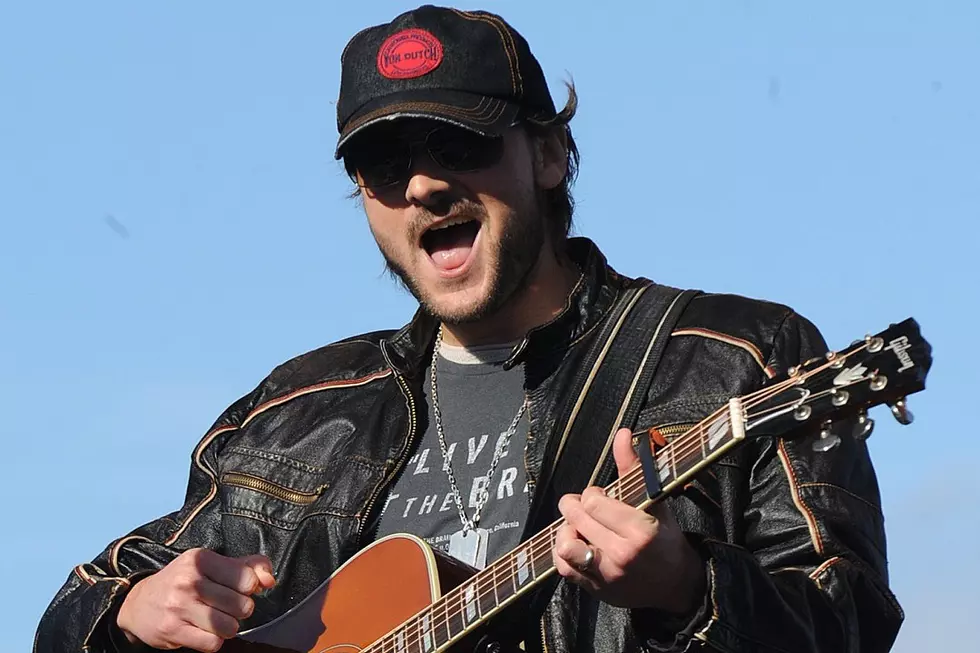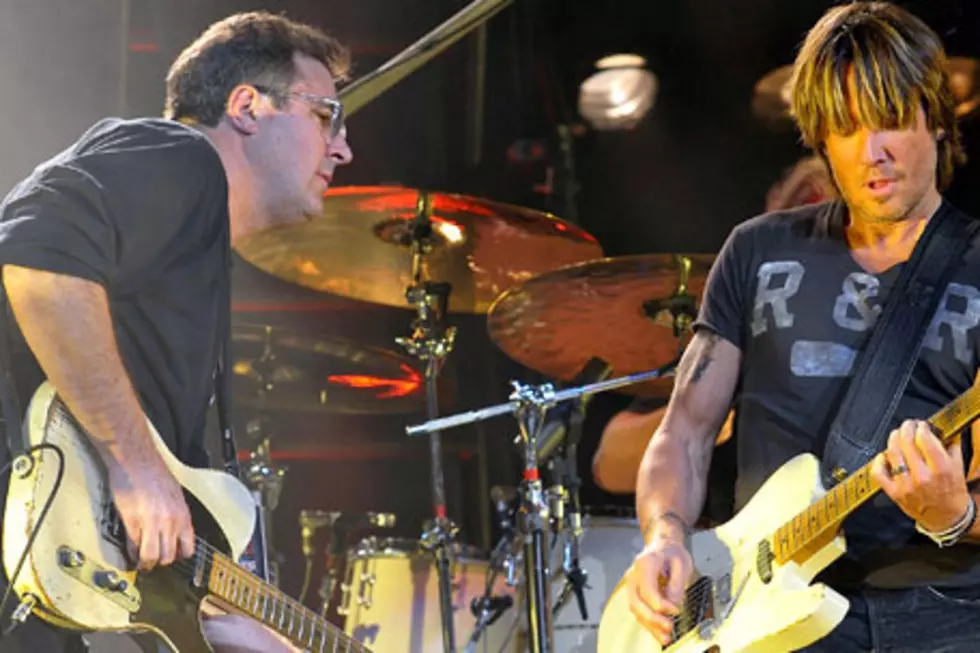
Eric Church Makes ‘Menacing’ Music for New Album, ‘Chief’
'Chief' is turning out to be quite an appropriate title for Eric Church's third studio album, as it debuted at No. 1 on both the country and pop charts, surprising even the most insider industry executives with first-week sales that quadrupled that of his sophomore CD. Unapologetically gritty and raw, the project's main inspiration was the country star's own live show. There are no sappy love ballads nor tear-in-my-beer heartache songs, but rather the kinds of songs Eric's fans like to raise their beer bottles to.
It's not all party songs, though. 'Chief' does have its thought-provoking moments that greatly reflect the North Carolina native's no holds barred personality. Take, for instance, the album's first single, 'Homeboy,' which some argue is a slam against the hip-hop/urban culture. Eric is quick to defend his lyrical intentions, without dismissing his accusers' opinions.
The Boot caught up with the singer/songwriter in AOL Music's New York City studios to talk about the new music and how another track actually spawned from negative press written by a jaded music critic. The dad-to-be, whose wife Katherine is expecting their first child in the fall, also waxes poetic on fatherhood and whether or not it will change this chief's devil-may-care attitude, at least musically.
With as much praise as 'Homeboy' has gotten, it also has its critics who have gone so far as to accuse the lyrics of being prejudiced. Did that throw you for a loop, or were you predicting controversy when you released it?
I knew when we released the song, but it was never intended to be. I can just say from my standpoint, at some point in my life I've been on the wrong path, and I think everybody's been on the wrong path. It's up to them to realize it and change their ways, and sometimes somebody helps them realize it. This is about one brother going to another and saying, "Hey man, you're on the wrong path. It's going to end up in a much worse place if you don't change." Now, some of the claims of prejudice were surprising. But at the same time, I knew that in illustrating this song, I'm not a guy who holds back. I go there. In the illustrations of this brother, we definitely made it very clear that he was on a path opposite of the other brother. In painting that picture, some people have taken that the way that it wasn't meant to be taken.
You have a few other songs in your catalog, like the new 'Country Music Jesus,' that are more consciously controversial. How do you think it's helped your career to make music that sparks debate?
I get so tired of artists and people in general who just won't take a stand. I've always been a fan of people who, even if I didn't agree with them, I liked that they said something. They had a point of view. The problem with a lot of music nowadays is it just doesn't have a point of view. It's background. It's filler. Love me or hate me, but I'm not a guy who's ever going to produce something that's background. It's going to have a point of view. That's an artist's job: share their point of view musically with their audience.
The message in 'Country Music Jesus' is that the genre needs "saving" by someone who's "preaching from the book of Johnny Cash." What does that say about your views of the current state of the genre?
That song is a little tongue-in-cheek. There was a particular critic who was lumping me in with a new generation, a new breed, and they didn't like where the music was heading. [The critic thinks] that we need to harken back to Johnny Cash, Waylon Jennings -- to make that kind of music. It bothered me a little bit because though I revere Cash and Waylon, I don't think we make the same music they did. They made different music than Hank Williams made. Even at a later time, guys like Garth Brooks came along and made different music. They changed the genre. It's my job to pick up the flag and take it somewhere it hasn't been. So, this song was a little bit tongue-in-cheek of my disagreeing with his inference that we had to make music sound like it was 1974. The evolution of music is good. You pay homage to who got you there, and then you take it somewhere else.
If you could change one thing about the country music industry, what would it be?
I would change the perception that the fan base of the format is a narrow fan base. It's very diverse. There's young guys, young girls, old guys, old girls and everything in between. We get caught up in marketing to a certain demographic and not making music that markets to everybody.
You pay homage to both Jack Daniels and Jesus on this record. How do the project's diverse themes reflect where you are in life right now?
Even back to [my debut album] 'Sinners Like Me,' I've always been open about being a flawed person. This record was really made from a live place. I had just come off the road when I wrote this record, and I have been out there with those fans every night. In this record, there are a lot of struggles, there are a lot of demons, there are a lot of good times, there's a lot of conflict. I love that the record is a little chaotic, but at the end of the day, this is one of those records that's just ... a little menacing. It stares you in the eye, and it does not blink and it dares you to blink. I like records that get up in your chin like that. It just puffs its chest out, and that's how our show is.
So many albums are made on laptops in an office or studio. 'Chief' was made in a cabin up in the woods, without TV or internet. How did that process affect the album?
I had my entire life to write that first record ['Sinners Like Me']. When I wrote the 'Carolina' record, I was out on the road touring. With this record, I needed a pause button to stop and examine where we had come from and how to take the next step. I just knew in my soul that this was going to be a big-step record and it needed to have a certain tone. The only way to establish what that tone was, was to go away and have some self-reflection and examine where to go from here. What I found is that when the industry didn't care about who I was and when radio didn't care about who I was, we always played shows and we've built our career on the backs of fans. I knew that this record had to sound like the live shows. Because of that, when we recorded this record a lot of the tracks are live. You can hear mistakes. You can hear us talking. We just let it just be what it was, and that's what's great about music. You need to have the soul and the feeling. Sometime you can over-think and choke that part out of it.
One song that's particularly awesome to see you play live is 'Springsteen,' which isn't exactly an ode to The Boss, but rather a reflection of your teen years. Is there a real story behind it?
I can remember being 15 or 16 years old and going to my first amphitheater concert with a group of friends. There was a certain girl ... We spread the blanket up on the lawn. I can remember our relationship didn't last that long -- maybe two weeks -- but it sparked there. 'Til this day, when I hear that artist I think about her, and I wonder if she thinks about me even though nothing really ever happened between us. It's just neat that music can connect you to a time and to a place. My favorite line in that song is "funny how a melody sounds like a memory."
Marriage and babies seem to soften a lot of your peers' songwriting styles, but not yours. Do you think it will after the baby is born?
I don't know. I know that fatherhood is going to change me, but I'm not sure to what level. It's one of those things you don't know until it happens, and I'm anxious to see what happens there. I can promise you this: I'm not going to be writing lullabies at any point in time, unless they're like bad-ass, kick-ass lullabies. [laughs] There's maybe a market for that out there somewhere.
Were you hoping the baby was a boy, or were you one of those typical expectant parents who claim to not care about the gender?
I was psyched when it was a boy! But it really was true though ... I used to make fun of my friends who used to say, "I don't care, boy or a girl." I called B.S. and said, "You care! What do you want it to be?" But truthfully, when we found out we were having a baby, you don't care. You want the baby to be healthy. But that being said, when I found out it was a boy it was a little bit of a relief for me. I was really scared that it was going to be a girl, and as a guy I knew that was going to be tough for me. I understand boys more. I may be wrong, I could regret this, but I feel like it'll be a little bit easier than having a girl first.
Let's say your son wants to be a musician. What's one thing you've learned the hard way that you'll teach him, to prevent him from making your same mistakes?
That's interesting, because I think it's OK to learn things the hard way. There's a lot of things I learned, but I wouldn't change any of them. You've got to follow your heart and follow the music where it leads you. As long as you're making music from your heart, it'll lead you where it is supposed to lead you. It led us out in the wilderness for a while. It wasn't the easiest path, it wasn't the quickest path, but it ended up being the right path and I wouldn't trade one mile of it.
More From TheBoot









